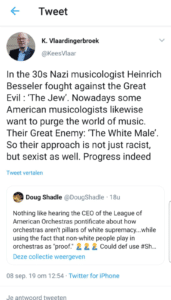This weekend, there was some fuss on Twitter. Something about a Nazi comparison that didn't quite work out. Now there is quite often a fuss on Twitter because of a Nazi comparison that doesn't quite work out, but this time it concerned one of our cultural figureheads. Kees Vlaardingerbroek, artistic director of the NTR Saturday matinee and former head of programming of Rotterdam's De Doelen concert hall, tweeted that an appeal by an American musicologist to include more people of colour and women in orchestra managements, because there were now too many white men in the management, was comparable to the hunt for Jewish musicians in Nazi Germany.
 You understand, this tweet did not please everyone. It was also a step further for Vlaardingerbroek than he did before, when he claimed in a highly controversial piece sent to De Volkskrant that the musical canon was in immediate danger because, according to him, people were disproportionately demanding attention for female and non-Western composers. He did not support this with evidence or sources, something Thea Derks on this site underlined again.
You understand, this tweet did not please everyone. It was also a step further for Vlaardingerbroek than he did before, when he claimed in a highly controversial piece sent to De Volkskrant that the musical canon was in immediate danger because, according to him, people were disproportionately demanding attention for female and non-Western composers. He did not support this with evidence or sources, something Thea Derks on this site underlined again.
Lobster
Again, remarkable for someone with a semi-public job, but Vlaardingerbroeck's suitability for his position is not what I want to talk about here. What is more interesting, in fact, is the thinking from which these agitations stem. In alt-right and heavily reformed circles, people fear the feminisation of society. Men would lose track and with it the West would become a sitting duck have become for perceived macho cultures like those from the middle east.
Retrieved from a vague book with something about lobsters in it after, lacked a scientific basis for that fear. Until now. In fact, Leiden University has produced a doctoral thesis that takes as its subject the end of patriarchy in a very special way. Bart Vieveen, chairman of the Board of Governors of the Stedelijk Gymnasium Leiden and once employed at the Ro Theatre in Rotterdam, obtained his doctorate on a dissertation in which he demonstrates through psychoanalytic interpretation of three Dutch-language literary works that the end of male hegemony is here.
Freud
These include Karakter by Bordewijk, De Avonden by Gerard Reve and a Hamlet adaptation by Tom Lanoye. Sandwiched between Aeschylus' Oresteia (500 BC) and Pim Fortuyn's The Orphaned Society, Vieveen unleashes Freud, Lacan and a whole trio of philosophers and writers on this classic Dutch trio.
'For Lacan, the father is the agency whose role is to release the child from its symbiosis with the mother and set it on the track of subjectivity and its own identity. The father role is also constitutive of the Other as personification of the law that regulates society. Lacan draws on Freud in this regard. The origin of the father role is described by Freud in a foundational primordial myth about a father, who leads a horde in an ultra-dominant way. From the sons' murder of the primordial father, comes the taboo, the predecessor of the law. Freud then describes how that law is necessary for the development of society and culture, but also inevitably causes unease in the individual.'
Vieveen uses 20th century literature to show then that this traditional role of the father is no longer tenable. Today's tragic heroes no longer define themselves through struggle with a father, but choose their roles and positions themselves, where struggle is not defining, but cooperation. This points to a return to a matriarchal system, something that Vieveen says has always lurked beneath society.
Athens
To demonstrate this, Vieveen harks back to the classical Greek Oresteia. That story of maternal murder and honour killing ends with the establishment of patriarchal law by the goddess Athene, who thus breaks with the matriarchal system that was valid before.
'Reve gives the mother a central place in the constellation from which he experiences meaning and religion. That image with a meaningless father and an exalted mother is diametrically opposed to the patriarchal constellation of which Orestes is a part at the end of the Oresteia.'
In over 300 pages of not always easy-to-read prose, this Leiden study outlines exactly the opposite of the Baudettian philosophy (and that of many other men with an ego problem) that saw life at that same university.
'Seen in this light, Aischylos' tragedy does not offer harmonic healing and moral reassurance, but is instead about "the insoluble brokenness from which the legal order as a human creation cannot escape". The order established by the court led by Athena in The Story of Orestes is, in the words of lawyer Lukas van den Berge, 'necessarily flawed' and 'by no means the triumph of reason that some see in it'.
But let's rather leave the conclusion to Vieveen himself:
'That the father role has changed needs no discussion. Freud, Lacan, Sloterdijk, Jameson, Lyotard, McGowan, Taylor, Verhaeghe and many other cultural observers signal the receding father role in historical perspective. However, this retreat from vertical transcendence, which I have described as a change from the neurotic subject position to the boundary of the psychotic subject position, can be appreciated differently. Instead of talking about an 'orphaned society', I have characterised this process as the 'emasculation of the tragic hero'. In the emancipated constellation, the sinthome replaces the oedipal father role as a third term. The sinthomatic cross-linking at the border position between the neurotic and psychotic subject position with an almost horizontal transcendence can be translated as the intersubjective position established in the relationship to the other.'
Eat that, Kees.
The Dissolution of the Tragic Hero, by Bart Vieveen. Publisher Garant.

